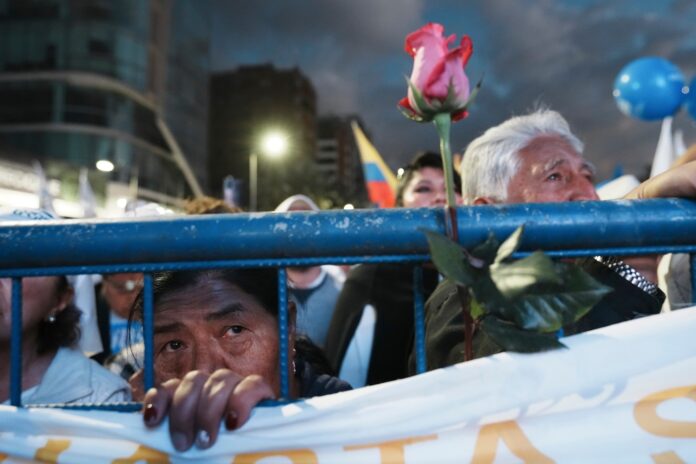Then, on Aug. 9, presidential candidate Fernando Villavicencio was fatally shot in the head by a hit man while leaving a campaign rally in northern Quito. His death, the first assassination of a presidential candidate in Ecuador, stunned the nation, dramatically shifted the election cycle, and marked a turning point for a country that has begun losing control of its cities and prisons to violent criminal organizations.
Squeezed between the world’s two biggest cocaine-producing nations, Colombia and Peru, this South American nation has become a key transit point for the trafficking of drugs to the United States and Europe. Mexican cartels and Albanian mafias have swept in, working with local criminal groups to compete for control of smuggling routes. Those groups have turned the country’s prisons, streets and ports into battlegrounds, bringing record levels of homicides and terrorizing residents with car bombs, extortion and kidnappings.
The violence has reached the highest level of politics and instilled fear among voters as they prepare to choose a leader they believe can resolve the crisis. Some officials worry that the violence could continue in the days ahead or even as voters head to the polls Sunday.
After Villavicencio’s assassination, the candidates have focused on tough-on-crime approaches to bringing control to the prisons, boosting police capabilities and rooting out corruption in the country.
“The candidates basically end up offering an iron fist without a clear strategy other than the presence of the armed forces in the street,” said Fernando Carrión, a political scientist at the Latin American Faculty of Social Sciences in Ecuador.
The next president will have very little time to introduce any solutions to the insecurity — only the 18 months remaining of Lasso’s term. To win outright on Sunday, a candidate needs to clinch more than 50 percent of the vote or at least 40 percent with a 10-point lead over the closest rival. With tight polls and a crowded field of candidates, a runoff election is expected to take place Oct 15.
Most polls show three candidates leading a field of eight: Luisa González, a leftist ally of the controversial but widely influential former president, Rafael Correa; Otto Sonnenholzner, a vice president during the administration of Lenín Moreno; and Jan Topic, a millionaire businessman running for office for the first time.
González, the only woman in the presidential race, held a wide lead earlier this month, riding a wave of wins for Correa’s party in local elections earlier this year. Her message has largely centered on bringing back the prosperity and relative safety of the Correa years. But her lead has slipped since the assassination, and polls show a swell of support for more right-leaning candidates promising to crack down on crime, such as Sonnenholzner and Topic. The messages, particularly from Topic, often echo those of controversial Salvadoran President Nayib Bukele, who has been praised and criticized for using mass incarceration to bring down the murder rate in El Salvador.
Villavicencio’s name also will be on the ballot. Ecuador’s electoral council has approved a replacement for him — the journalist Christian Zurita — but the ballots had already been printed with the late candidate’s name.
Villavicencio was the latest in a series of candidates and political leaders assassinated in recent months in Ecuador. The mayor of the port city of Manta was killed late last month, and a candidate for the National Assembly was assassinated a week earlier in Esmeraldas. Two other mayoral candidates were killed earlier in the year. Less than a week after Villavicencio’s death, a political leader for the leftist party of former president Rafael Correa also was assassinated.
One Ecuadoran intelligence official, speaking on the condition of anonymity because he was not authorized to give an interview, said he believed the criminal organizations have “already shown their power.” But he said he fears the next threat could be toward the armed forces. He worried about possible election day violence in places under the control of criminal groups and argued that the country’s security forces do not have the necessary capacity to respond.
Gen. Fausto Salinas, commander of Ecuador’s national police, said in an interview that police and military intelligence units are monitoring the country for further threats and have not raised any specific alerts. Around 100,000 security forces personnel have been deployed across the country to help maintain order ahead of and during the vote Sunday.
“We have a plan,” Salinas said. “We are mobilizing everything we have to be able to guarantee that the elections will be peaceful.”
Still, voters in Quito last week said they were afraid even to show up to vote, which is mandatory for adults ages 18 to 64. Some, like 35-year-old Veronica Proaño, have little hope that any of the candidates will be able to bring an end to the violence. Sipping on coffee at a bakery around the corner from the site of Villavicencio’s killing, Proaño said she was still undecided.
A psychologist and mother of three, she wishes she could leave the country to raise her children elsewhere. She said she was recently robbed at her front door by a man on a motorbike who told her to hand over everything.
Juana Racines, 65, who runs a catering business nearby, said she regretted voting for Lasso in the last election. She argued that his presidency was “weak” and did little to stop the drug violence from growing in the country. She had supported Villavicencio and was now leaning toward Topic, a political outsider who has touted his experience with his security company and as a former sniper and soldier in the French Foreign Legion.
“We don’t believe in politicians anymore,” she said. “We need someone with strength, with bravery, who will help us get out of this.”



